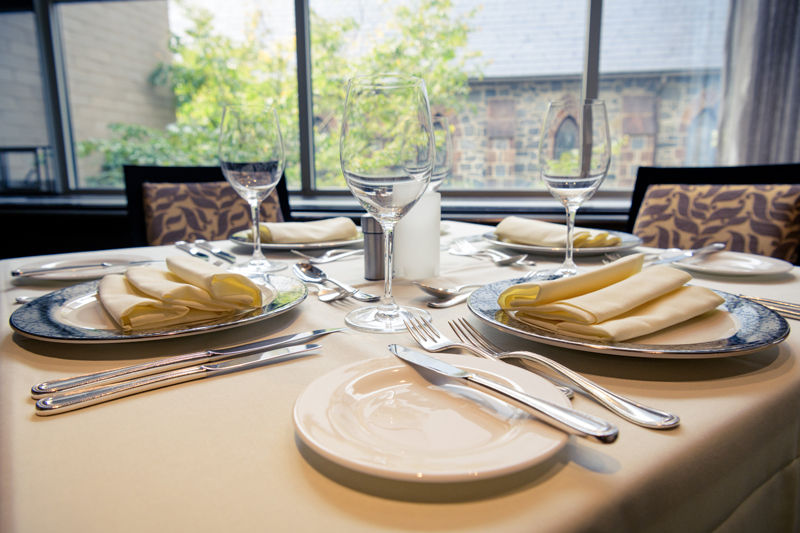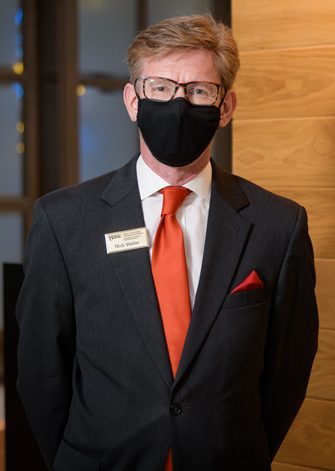


How to be a better diner
Photos by Evan Krape October 02, 2020
UD hospitality instructor Nicholas Waller shares strategies for becoming a more considerate restaurant goer
When Nicholas D. Waller worked as maître d' at the uber-posh restaurant of the world-class Savoy Hotel in London, the late comedian and actor Dudley Moore came in for a meal. The restaurant’s sommelier, or head wine steward, delivered the celebrity guest an expensive bottle he’d ordered and, as is customary, poured him a taste.
“Dudley Moore swirled the wine, sipped it and spat it all over the table,” said Waller, instructor of hospitality business management at the University of Delaware. “He was only joking, but the wine waiter was shocked and horrified.” (Of course, embattled members of staff weren’t nearly as apoplectic as that time Frank Sinatra requested a bit of club soda to add to his $650 1966 Château Lafite-Rothschild, Waller said, but that’s a story for a different day.)
When it comes to restaurant etiquette, spitting alcohol — like snapping at a server or demeaning a bus person — falls pretty squarely into the clearly-wrong-and-egregious category. But according to industry insiders, not all bad dining behaviors are this obvious — at least not to the serial offenders who commit them. While most customers fancy themselves capable of enjoying a meal without offense, many leave a string of aggrieved employees in their wake.
“Restaurant etiquette has moved into the shadows, unfortunately,” Waller said. “I think it’s part of the casualization of society. People hear the term ‘restaurant etiquette’ and they picture Downton Abbey, but it doesn’t have to be stuffy and fancy. Good manners are simply about making those around you feel good.”
As the coronavirus (COVID-19) pandemic continues to cause upheaval for the restaurant industry, consideration of these manners has never been more important. UDaily sat down with Waller — manager of Vita Nova, UD’s student-run, fine dining restaurant — for his input on five strategies for becoming a better restaurant-goer.
Keeping the wine inside your mouth? That one goes without saying.
Show up (and leave) on time
It’s easy to assume that a reservation system is meant purely for guest convenience. But it’s also the mechanism by which a commercial kitchen controls pacing and operates in a timely fashion. Turn up late or with more guests than you’ve indicated, and you may be throwing staff into the weeds, industry speak for an unmanageable workload. The end result? Sabotaging the experience for yourself and fellow customers.

Don’t show up at all (20% of big-city reservations belong to no-shows) and you could seriously compromise a restaurant’s bottom line — and your own. Some establishments have begun publicly shaming no-shows on social media or charging them as much as $200. Especially during a pandemic when seating capacity is restricted, booking responsibly includes offering as much notice as possible, should you need to cancel.
Once you arrive, try not to take it personally if you’re shown to a table you don’t love — seating a dining room is a nuanced puzzle involving many factors. Staff, for instance, often divide the room by sections, and a host is responsible for evenly distributing customers between them to ensure efficient service. If you know you are a person with an attitude of nobody-puts-baby-in-the-corner (or by a door, or by a bar, or near a heating vent or window, or too close to a bathroom) it’s best to call with that information in advance.
“Or just expect a wait,” Waller said. “If you say you would like a different table but you don’t mind waiting a few moments, that takes the pressure of the restaurant and gives them time to make a few switches and come up with something new.”
Finally, if you’re inclined to linger long (long, long) after you’ve polished off dessert and paid your check — a practice restaurant insiders call “camping” — ask first if anyone is waiting for your seats. If so, consider moving along.
Stick to the menu — for the most part
Most restaurants are happy to accommodate dietary restrictions, allergies and other special requests. At Vita Nova, Waller said, “We say the answer is yes… what is the question?” And when he worked at Wilmington’s Hotel du Pont, he once arranged for an engagement ring to be lowered from a balcony with fishing wire during a proposal set to the tune of live, romantic harp music.
The key is asking for such things politely and with as much advance notice as possible. As long as there’s a good reason for the accommodation, service people “want to wow their guests and make them feel special,” Waller said.
But if you’re making special requests simply for the sake of it or, say, because it inflates your ego — if you want your table decorated with pomegranate seeds or you want your kale leaves thrice massaged or, in the case of one of Waller’s former customers, you want your grapes peeled — you should probably check your power trip at the door. Not only is such a thing potentially obnoxious, it’s not in your best interest as a diner.
“The menu is there for a reason,” Waller said. “Because that’s what a restaurant does best.”
Tip!
The federal minimum wage for tipped employees in America is $2.13 per hour — not typically enough to cover taxes in a given pay period. That means most servers are entirely dependent on gratuities — problematic considering, according to a recent study, nearly one-third of millennial respondents copped to tipping less than 15% for restaurant service. (Waller said a good standard is closer to 18%.)
While poor tipping may seem like decent recourse for poor service, it’s important to bear in mind that bad experiences aren’t always the result of negligence. Unless you catch your waiter playing a game of solitaire at the bar while you wait to be acknowledged, it is possible delays are down to a short-staffed dining room (a tough reality for many establishments during COVID-19). It’s also possible a computer ordering system went down in the middle of service, as computer systems are wont to do. And it’s further possible fellow diners showed up 30 minutes late for their reservations, wreaking havoc on operations (see point number one).
Keep in mind, also, that servers are often responsible for sharing tips with bartenders, bussers, food runners and sometimes dishwashers. In this case, stiffing one means stiffing all.
Deal with disappointment — the right way
It’s easy to feel slighted when a dining experience goes awry, especially if you’ve paid good money for it. But it’s best to take a deep breath before ranting about this disappointment on Yelp or TripAdvisor.
One consumer survey found 94% of customers now choose where to eat based on online reviews. In other words, a growing army of citizen critics are having a real impact on restaurant profitability — or lack thereof. But these testimonies are not always valid. Sometimes, for example, reviewers are influenced by previous ratings or their own state of mind while writing. Even one’s posture can shape a dining experience and subsequent review.
“Don’t sit and fume and go away and cogitate over what a horrible experience you had,” Waller said. “If you’re waking up in the middle of the night thinking about it, you may get vindictive and then write something everyone can see, and that’s just egotistical, really.”
Instead of venting, he added, the proper thing is to look at this as an opportunity to help the restaurant improve — speak with the manager on site, air grievances in a controlled fashion and, if appropriate, ask for compensation. Be specific about what, exactly, you feel should come off your check and why. The resulting dialogue will likely feel more constructive than any scorched-earth Yelp tirade.
“Some of the best and most loyal customers over the years have been those whose complaints I’ve been able to handle effectively because I’ve known about them,” Waller said. “If the establishment has the opportunity to handle it there and then, you will find as a customer they really want to take care of you, and you will come out of it much better than you’re expecting.”
Cultivate compassion
When dining out, it’s important to remember that it's humans and not robots who are cooking and serving and clearing your plates — fallible, butter-fingered humans. This means mistakes are bound to happen. If you’ve stumbled into someone’s bad day at the office — a bad day made all the more difficult by a global pandemic and economic crisis — the most important piece of restaurant etiquette is, arguably, to show some grace.
“It’s indicative of life,” Waller said. “If you want something from someone — if you want a great experience — you need to treat them well to start with. Be civil and polite, and people will want to help you.”
And if all else fails? If a restaurant loses your reservation, spills pea soup in your lap or runs out of creme brulee? If your whole night becomes a nightmare of forgotten iced teas, soggy fries or overcooked gluten-free duck breast cassoulet?
At least it’s only dinner.
Contact Us
Have a UDaily story idea?
Contact us at ocm@udel.edu
Members of the press
Contact us at 302-831-NEWS or visit the Media Relations website

